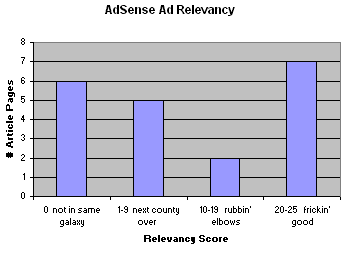Think Like Google with AdSense
A conversation with my son Matt confirmed my
suspicion. The Google AdSense ads I recently installed on this
website are actually giving me an insight into what the Google
search engine spider cherry-picks from of my web page content.
It's not hard to imagine: AdSense ads are context sensitive.
They exist as scripts on the web page. In order to be context
sensitive, the script must initiate an indexing when the page is
opened and refreshed.
Is there any reason to think that the indexing process performed
by Google AdSense would be different from the process used by
Google the search engine? None I can think of. Both indexing
processes need to do the same job: extract core meaning from a
page and compare it to a database.
In AdSense, the database contains paid ads waiting for a
relevancy match. In search, the database holds keywords. But the
meaning extracted from the web page could easily be identical.
Therefore, one might get a peek into the Google indexing
algorithm by reviewing a series of web pages which display
AdSense ads, and studying the ad content.
Studying AdSense Relevancy on Poingo.com
I studied the 30 or so pages on this site and checked the
AdSense ads on each page for relevancy to the page content.
Results were quite interesting.
The site contains a number of pages which present the features
of various software or service offerings. Verbiage on these
pages tends to be sparse and oriented toward key concepts.
On these product presentation pages, AdSense did a great job of
extracting meaning.
For example, the page offering Poingo Email Printer, software
which creates PDFs, was accompanied by AdSense ads which all
pertained to PDF conversion. Text on the page was minimal, but
the page title contained "create PDF", there were 3 keywords
metatags containing "PDF", and the first paragraph contained
"convert PDF" in bold.
From an indexing standpoint the page spoon-fed meaning to
Google, and obviously there was a wellspring of PDF software
advertisers for Google to find in its database. A match (or five
matches to be exact) made in heaven!
Similarly, pages offering FTP software and an Outlook add-in
received highly relevant companion ads. Again, words on the page
were sparse, but page title and paragraph text contained the
obvious words FTP and Outlook respectively, and Google AdSense
took the bait like a trout succumbing to Robert Redford.
The three pages mentioned above offered essentially single
concept offerings. PDF. FTP. Outlook. No confusing multiple
choices.
When analyzing the page which offers Lightning Navigator, hotkey
shortcut software with multiple features, AdSense picked one
feature, screen capture, to orient 3 of the 5 the companion ads.
Interestingly, screen capture is listed seventh on the list of
product features. It follows six other features which were all
keyword-optimized but ignored by AdSense.
From previous research, I recall that keywords pertaining to
screen capture such as "print screen", "screen shot", and
"screen grab" receive many more clicks per day than other
features such as "automatically create email" and "internet
shortcut".
Apparently in this example, AdSense was quickly able to select
the key concept for which it had the most ads to apply, and then
threw most of its ad eggs in this basket.
Interaction between page and AdSense now becomes more
interesting. Inventory of relevant advertisers becomes a factor
in selecting key concept. That makes sense. You can't post an ad
if it's not in the queue.
The non-screen capture ads on the Lightning Navigator page are
as follows:
1 for shortcuts (highly relevant)
1 for surveillance equipment (huh??)
I have no doubt that there is a reason the surveillance
equipment ad appeared, but it was not visible to me in the text
of my page, the ad itself, or the page to which the ad linked.
Mysteries abound in the "second-guess-the-Google-algo" world.
If your eyes are not bleary yet, stick around. There is more to
tell.
AdSense Relevancy for Articles
A sizeable portion of the Poingo website is the article section.
Here I publish articles about small business and people,
processes and technology in the workplace.
Rebelliously, these articles were written without use of a
keyword suggestion tool! They are written in 100% non keyword
optimized English. What did Adsense do with these verbose,
intellectual, index-elusive rants?
To appear scientific - after all, somebody might actually read
this - I developed a down-and-dirty rating scale. First I
counted the number of relevant ads (of 5 total) per page, then I
multiplied it by a subjective relevancy score scaled 1 through
5, where 5 is "frickin' good" and 1 is "obscure at best."
To maintain consistent subjectivity, all ratings were performed
after morning coffee and on non-bill-paying days.
A page score of 25 (5 ads x relevancy score of 5) would be a top
score ("AdSense, you're seeing into my very soul") and 0 would
be ("We never talk anymore, You don't even know me(sniff)").
Here is the scoring:
 Results of AdSense Relevancy Study
AdSense scored an average of 10.5 out of a possible 25 on these
illuminating, erudite but non optimized articles. Yet in 7
articles out of 20, Google scored the coveted "frickin' good"
appellation. Google "understood" 35% of the articles with high
accuracy.
Beyond that, there was a chasm of irreconcilable
misunderstandings leading ultimately to the vacuum of deep
space. What does it mean to us little folk waving our flags and
trying to get noticed on the web?
Keep your message simple and clean, boiled down to one or two
key concepts on a page. The spiders want to understand us but
they are kinda dumb. At least that's what Matt says.
Back to Top
|

|



